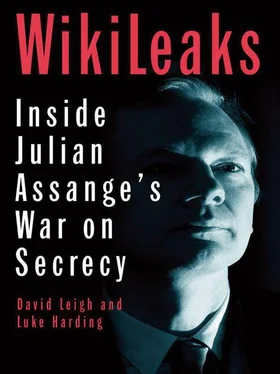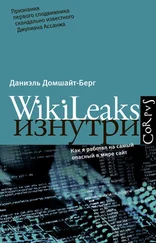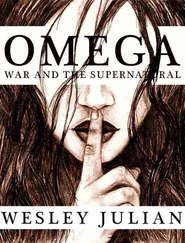Harding, Luke - WikiLeaks - Inside Julian Assange's War on Secrecy
Здесь есть возможность читать онлайн «Harding, Luke - WikiLeaks - Inside Julian Assange's War on Secrecy» весь текст электронной книги совершенно бесплатно (целиком полную версию без сокращений). В некоторых случаях можно слушать аудио, скачать через торрент в формате fb2 и присутствует краткое содержание. Жанр: Старинная литература, на английском языке. Описание произведения, (предисловие) а так же отзывы посетителей доступны на портале библиотеки ЛибКат.
- Название:WikiLeaks: Inside Julian Assange's War on Secrecy
- Автор:
- Жанр:
- Год:неизвестен
- ISBN:нет данных
- Рейтинг книги:3 / 5. Голосов: 1
-
Избранное:Добавить в избранное
- Отзывы:
-
Ваша оценка:
- 60
- 1
- 2
- 3
- 4
- 5
WikiLeaks: Inside Julian Assange's War on Secrecy: краткое содержание, описание и аннотация
Предлагаем к чтению аннотацию, описание, краткое содержание или предисловие (зависит от того, что написал сам автор книги «WikiLeaks: Inside Julian Assange's War on Secrecy»). Если вы не нашли необходимую информацию о книге — напишите в комментариях, мы постараемся отыскать её.
WikiLeaks: Inside Julian Assange's War on Secrecy — читать онлайн бесплатно полную книгу (весь текст) целиком
Ниже представлен текст книги, разбитый по страницам. Система сохранения места последней прочитанной страницы, позволяет с удобством читать онлайн бесплатно книгу «WikiLeaks: Inside Julian Assange's War on Secrecy», без необходимости каждый раз заново искать на чём Вы остановились. Поставьте закладку, и сможете в любой момент перейти на страницу, на которой закончили чтение.
Интервал:
Закладка:
This event was something new – the internet equivalent of a noisy political demonstration. What had begun with a couple of teenage nerds had morphed into a cyber-uprising against attempts to restrict information. As they put it in one portentous YouTube video, upon a soundtrack of thrashing guitars: “We are everywhere.” They were certainly in the Netherlands, at least, where, in December, police arrested a 16-year-old and a 19-year-old. Some Anonymous supporters without sufficient computer skills had overlooked the fact that the software – called LOIC – being offered to them to run attacks would give away their internet location. Police could, given time, tie that to a physical user.
Behind all this online turbulence, however, a much more serious game was afoot. President Obama’s attorney general, Eric Holder, called a press conference to announce there was now an “active, ongoing, criminal investigation” into the leaking of classified information. He promised to hold those who broke US law “accountable”, and said: “To the extent that there are gaps in our laws, we will move to close those gaps, which is not to say that anybody at this point, because of their citizenship or residence, is not a target or a subject of an investigation that is ongoing.” In Alexandria, Virginia, just outside Washington, rumours began to spread that a secret grand jury had been empanelled, and many subpoenas were being prepared for issue. Bradley Manning, the young soldier who had by now spent seven months in virtual solitary confinement, would only see an end to his harsh treatment, his friends started to believe, if he was willing to implicate Julian Assange and WikiLeaks in some serious crimes.
It seemed clear that prosecuting Assange – an Australian citizen now living in the UK – for espionage or conspiracy was going to be an uphill affair, not least because of the old-fashioned nature of the US Espionage Act. But it was also clear that an exasperated White House wanted to be seen vigorously pursuing this option. Would the justice department try and winkle Assange out of his hideaway in the English countryside? And was there not a still unresolved police investigation into his behaviour in Sweden? The threat of extradition – and the possibility of several decades in a US supermax jail – began to loom over Assange, as the rest of the world sought to digest the significance of the cascade of documents he had released.
CHAPTER 16
The biggest leak in history
Cyberspace
30 November 2010
“ It is the historian’s dream. It is the diplomat’s nightmare ”
TIMOTHY GARTON ASH, HISTORIAN
What did we learn from WikiLeaks? The question, as with virtually everything else to do with the leaks, was polarising. There was, from the start, a metropolitan yawn from bien pensants who felt they knew it all. Arabs don’t like Iran? The Russian government is corrupt? Some African countries are kleptocracies? Go on, astonish us. You’ll be telling us next that the pope is Catholic.
According to this critique the disclosures stated the obvious, and amounted to no more than “humdrum diplomatic pillow talk”. (This was from the London Review of Books . Academic Glen Newey said he was unimpressed by the revelation that French leader Nicolas Sarkozy “is a short man with a Napoleon complex”.)
Then there were the people who argued that the cables did not reveal enough bad behaviour by Americans. On the left this was a cause for disappointment – and, sometimes, suspicion. A small cabal began poring over the cables for evidence of ideological editing or censorship. And why so little on Israel? On the right, and from government, this served as fuel for the argument that there was no public interest in publication. This was not the Pentagon papers, they reasoned. There was little malfeasance in American foreign policy revealed in the documents, so where’s the justification for revealing all? Then there was the US government’s insistence that the leaks were endangering lives, wrecking Washington’s ability to do business with its allies and partners, and helping terrorists.
What these arguments missed was the hunger for the cables in countries that didn’t have fully functioning democracies or the sort of free expression enjoyed in London, Paris or New York. Within hours of the first cables being posted the Guardian started receiving a steady stream of pleading requests from editors and journalists around the world wanting to know what the cables revealed about their own countries and rulers. It was easier to call the revelations unstartling, dull even, if one lived in western Europe, rather than in Belarus, Tunisia, or in any other oppressive regime.
This was as powerful a case for the WikiLeaks disclosures as any. It was not particularly edifying to see western commentators and politicians decrying the public interest in the publication of information which was being avidly, even desperately, sought after by people in far off countries of which they doubtless knew little. Who was to say what effect these disclosures would have, even if, on one level, they were revealing things that were in some sense known? The very fact of publication often served as authentication and verification of things that were suspected.
In fact, far from being routine, the leak was unprecedented, if only in size. WikiLeaks called it, accurately, “the largest set of confidential documents ever to be released into the public domain”. There were 251,287 internal state department communiqués, written by 280 embassies and consulates in 180 different countries. Among them were frank, and often unflattering, assessments of world leaders; analysis, much of it good quality; as well as comments, reports of meetings, summations, and gossip. There were accounts of vodka-fuelled dinners, meetings with oligarchs, encounters in Chinese restaurants and even that Saudi Arabian sex party. Some cables were long essays, offering fresh thinking on historically knotty problems, such as Chechnya; others simple requests to Washington.
They highlighted the geopolitical interests and preoccupations of the US superpower: nuclear proliferation; the supposed threat from Iran; the hard-to-control military situation in Kabul and Islamabad. The American embassy cables came from established power centres (London and Paris) but also the far-off margins (Ashgabat, Yerevan and Bishkek). Boring they are not. On the contrary, they offer an incomparably detailed mosaic of life and politics in the early 21st century.
But more importantly than this, they included disclosures of things citizens are entitled to know. This is true for Americans and non-Americans. The cables discussed human rights abuses, corruption, and dubious financial ties between G8 leaders. They spoke of corporate espionage, dirty tricks and hidden bank accounts. In their private exchanges US diplomats dispense with the platitudes that characterise much of their public job; they give relatively frank, unmediated assessments, offering a window into the mental processes at the top of US power. The cables were, in a way, the truth.
The constant principle that underpinned the Guardian ’s selection – what to print and what not – was whether a cable contained material that was in the larger public interest. Nowhere was this more clear-cut than with a classified directive from July 2009 that revealed the US government was spying on the United Nations, and its low-key South Korean secretary general, Ban Ki-moon. The cable began by requesting predictable diplomatic information about positions and views on hot topics such as Darfur, Somalia, Afghanistan, Iran and North Korea. But read more closely it clearly blurred the line between diplomacy and spying.
The directive from Washington asked for sensitive communications information – passwords, encryption codes. It called for detailed biometric information “on key UN officials, to include undersecretaries, heads of specialised agencies and their chief advisers, top SYG [secretary general] aides, heads of peace operations and political field missions, including force commanders”, as well as intelligence on Ban’s “management and decision-making style and his influence on the secretariat”. Washington also wanted credit card numbers, email addresses, phone, fax and pager numbers and frequent-flyer account numbers for UN figures. It was also after “biographic and biometric information on UN security council permanent representatives”.
Читать дальшеИнтервал:
Закладка:
Похожие книги на «WikiLeaks: Inside Julian Assange's War on Secrecy»
Представляем Вашему вниманию похожие книги на «WikiLeaks: Inside Julian Assange's War on Secrecy» списком для выбора. Мы отобрали схожую по названию и смыслу литературу в надежде предоставить читателям больше вариантов отыскать новые, интересные, ещё непрочитанные произведения.
Обсуждение, отзывы о книге «WikiLeaks: Inside Julian Assange's War on Secrecy» и просто собственные мнения читателей. Оставьте ваши комментарии, напишите, что Вы думаете о произведении, его смысле или главных героях. Укажите что конкретно понравилось, а что нет, и почему Вы так считаете.












